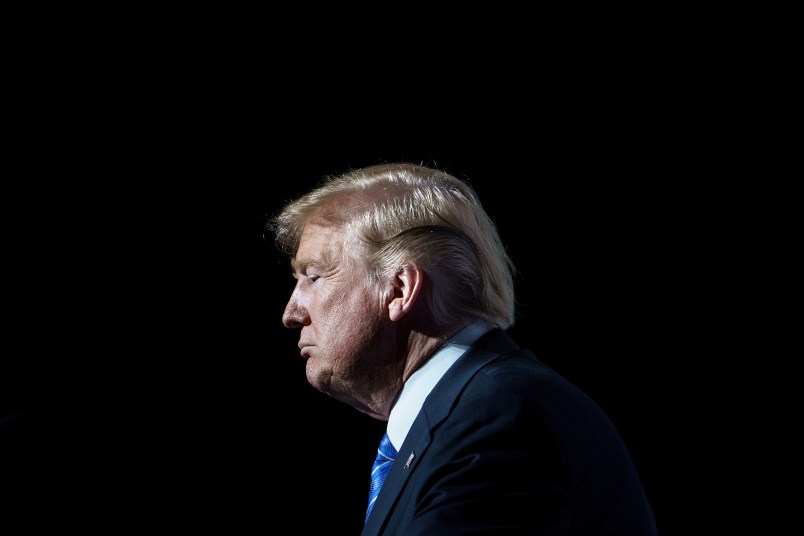WASHINGTON (AP) — While Donald Trump has positioned himself as a tough, “law and order” president, he has mostly excluded one group of offenders from his sights: those of the corporate class, according to a report released Wednesday by Washington-based watchdog Public Citizen.
The report found that in 11 of the 12 federal agencies led by a Trump-appointed official during the president’s first year, penalties imposed on corporate violators dropped, in the majority of cases by more than 50 percent.
Penalties dropped at the Justice Department by 90 percent, the Commodity Futures Trading Commission by 80 percent and the Securities and Exchange Commission by 68 percent.
The largest drop was at the Environmental Protection Agency, formerly led by Scott Pruitt, where overall penalties dropped by 94 percent, from nearly $24 billion in President Barack Obama’s last year in office to $1.5 billion. Penalties at the Federal Communications Commission dropped overall by 85 percent.
The EPA and FCC data doesn’t break out actions against corporations as well as municipalities and individuals. The FCC’s data was mostly made up of corporate offenders while the EPA’s data was mostly a mix of municipalities and corporate offenders, according to Public Citizen.
Reducing regulations on business, in general, was one of Trump’s earliest campaign promises. And the Public Citizen report found that it was indeed a promise kept.
“Despite all his various tics and tantrums, he’s a corporate CEO,” said Rick Claypool, who co-wrote the report. “So he’s coming into it with that corporate mindset, and his sympathies are going to be with the companies on the receiving end of that enforcement action.”
Claypool said he found it striking that federal agency heads are willing to work with companies to bring them into compliance and avoid harsh penalties while their attitude toward low-level drug offenses and first-time border crossings has been zero tolerance.
One example given in the report was the case of Minnesota-based Syngenta Seeds LLC. In the last full month of the Obama administration, the EPA announced it would be seeking nearly $4.9 million in penalties against the company for violating pesticide regulations meant to protect agricultural workers at its farm in Hawaii.
Two months later, in the first full month of the Trump administration, the EPA agreed to have the company’s penalty lowered to $150,000 and have it spend $400,000 on a worker safety curriculum and training program.
Of the agencies on the list, one did have a sizable increase in penalty sums. The amount of penalties issued by the Office of Foreign Assets Control increased its penalty sums by 465 percent, from $22 million to $124.2 million. The increase is representative of a more overtly robust stance on the issue.
Trump has used the threat of sanctions in his diplomacy efforts, including against Chinese institutions in its dealings with telecom giant ZTE — which ultimately became a bargaining chip for Trump’s own business operations. The president also allowed the threat of sanctions to loom in a recent tweet about “consequences” against Iran for its behavior. The agency under Trump has added more than 100 people and entities connected to North Korea to its blocked persons.
And yet, enforcement actions otherwise have dropped in 10 of 12 agencies under the Trump administration in 2017, according to the Public Citizen report.
There was a 48 percent drop in enforcement actions — from 27 to 14 — during Trump’s first year in office. Enforcement dropped by 44 percent for the SEC and 39 percent for the FCC.
Since enforcement actions span years, the report credited the administration in power with the action. The researchers also noted that because these are ongoing processes that aren’t susceptible to abrupt changes, given typically unchanged career staffs, the findings are more notable.
The report was released with Violation Tracker, a corporate enforcement database produced by the Corporate Research Project of Good Jobs First, and only included agencies with reliable public data and where a Trump-appointed leader or commission chair was in charge for at least half of 2017.







This is the kind of bullshit that slides by because we’re focused on the far more outrageous stuff. If Dubya had done this we’d be screaming about it. So, so much to clean up when this is all over DAMN.
It’s crystal clear why Republicans won’t impeach the traitor. SO every last one needs thrown out yeasterday. The pool has been crapped in beyond all chlorine and basically just needs drained and started over.
But … paid speeches to Goldman Sachs.
This.
It is going to take us years after we get rid of the filthy corrupt beast to uncover all of this stuff. It will be like the post WWII years rooting out the murderers and thieves of the Third Reich by chasing paper trails and witnesses. I wouldn’t put it past many of the officials of this (mal)administration to have destroyed documents to cover their tracks. Legal obligations for records keeping and FOIA are things the GOP view as “for the other party.” We see this with (politically) redacted materials coming out of the DOJ all the time.
Best to tamp your enthusiasm a bit about justice being served: